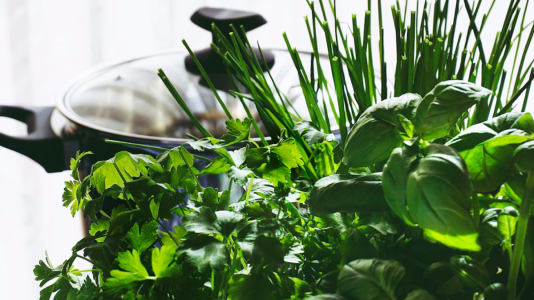Could your herbs be hiding more than just flavor?
- Replies 0
It’s easy to fall in love with the crisp aroma of fresh herbs.
A few green sprigs can turn a plain meal into something memorable.
But as beautiful as they look and as vibrant as they taste, those leafy greens may be hiding more than just culinary magic.
And if you’re not giving them a proper rinse, you might be adding something unwanted to your plate.
Fresh herbs, whether organic or not, are often grown low to the ground—where dirt and bacteria thrive. They’re also handled many times before reaching your kitchen. That’s why rinsing them is more than just a formality.
According to one food expert, “It’s important to carefully wash any produce—including fresh herbs—because [it] is handled before being sold, and whether the item is organic or conventional, the growing process leaves deposits on the item.” Even if your herbs look spotless, that doesn’t mean they’re safe. Some contaminants can cling to even the cleanest-looking leaves.
A study published in the Journal of the Science of Food and Agriculture revealed that 24% of cilantro, parsley, and basil from 13 farmers markets tested positive for generic E. coli.
That’s not just a cosmetic concern—it’s a real risk if those herbs are eaten raw.
Think salsa, salads, or garnishes. If your herbs are going straight from fridge to plate, skipping a proper wash could make all the difference.

Yes, cooking can reduce or eliminate harmful bacteria. But not all herbs end up in hot dishes. Popular herbs like basil or cilantro are often used fresh.
And that’s when the danger creeps in.
When raw herbs are added to guacamole, pesto, or even just sprinkled over pizza, whatever’s lurking on the leaves goes straight into your meal. That’s why cleaning your herbs thoroughly is your best defense.
Rinsing your herbs doesn’t just protect your health—it extends shelf life, too. Damaged or dirty leaves spoil faster and can cause the whole bunch to go bad.
One culinary expert noted, “Washing right away is actually good for the shelf life of the herbs.” She explained that removing bad leaves early can slow down spoilage. Still, not all herbs are the same.
Delicate varieties—like tarragon or dill—should be washed only right before using to prevent bruising.
Also read: Are you eating the riskiest foods in America? Here’s what you need to know—without panicking
Ready to give your herbs the treatment they deserve? Here’s the method that experts swear by:
Also read: Discover the surprising food tip that could shield you from E. coli!
Got more herbs than you need? There are smart ways to save them.
Every leaf counts.
Read next: Are your groceries putting you at risk? Nearly thousands die annually from this silent killer!

Have you ever had gritty cilantro ruin a dish? Do you have a tip for keeping parsley fresh for weeks? Share your thoughts in the comments. Everyone loves hearing how our GrayVine readers keep their kitchens safe and flavorful.
A few green sprigs can turn a plain meal into something memorable.
But as beautiful as they look and as vibrant as they taste, those leafy greens may be hiding more than just culinary magic.
And if you’re not giving them a proper rinse, you might be adding something unwanted to your plate.
Fresh herbs, whether organic or not, are often grown low to the ground—where dirt and bacteria thrive. They’re also handled many times before reaching your kitchen. That’s why rinsing them is more than just a formality.
According to one food expert, “It’s important to carefully wash any produce—including fresh herbs—because [it] is handled before being sold, and whether the item is organic or conventional, the growing process leaves deposits on the item.” Even if your herbs look spotless, that doesn’t mean they’re safe. Some contaminants can cling to even the cleanest-looking leaves.
A study published in the Journal of the Science of Food and Agriculture revealed that 24% of cilantro, parsley, and basil from 13 farmers markets tested positive for generic E. coli.
That’s not just a cosmetic concern—it’s a real risk if those herbs are eaten raw.
Think salsa, salads, or garnishes. If your herbs are going straight from fridge to plate, skipping a proper wash could make all the difference.

Fresh herbs, whether organic or not, are often grown low to the ground—where dirt and bacteria thrive. Image Source: Suzy Hazelwood / Pexels
Yes, cooking can reduce or eliminate harmful bacteria. But not all herbs end up in hot dishes. Popular herbs like basil or cilantro are often used fresh.
And that’s when the danger creeps in.
When raw herbs are added to guacamole, pesto, or even just sprinkled over pizza, whatever’s lurking on the leaves goes straight into your meal. That’s why cleaning your herbs thoroughly is your best defense.
Rinsing your herbs doesn’t just protect your health—it extends shelf life, too. Damaged or dirty leaves spoil faster and can cause the whole bunch to go bad.
One culinary expert noted, “Washing right away is actually good for the shelf life of the herbs.” She explained that removing bad leaves early can slow down spoilage. Still, not all herbs are the same.
Delicate varieties—like tarragon or dill—should be washed only right before using to prevent bruising.
Also read: Are you eating the riskiest foods in America? Here’s what you need to know—without panicking
Ready to give your herbs the treatment they deserve? Here’s the method that experts swear by:
- Inspect first: Remove twist ties, rubber bands, and any damaged leaves. These can speed up spoilage.
- Rinse under cold water: Turn herbs gently in your hand to make sure every surface is cleaned. For sandy herbs like cilantro, fill a bowl with cold water, swish the leaves, and let the grit settle.
- Dry the right way: Let them drip over the sink. Use a salad spinner for sturdy herbs like rosemary or parsley. For softer herbs, pat dry with a clean towel.
- Wrap and store: Use a slightly damp paper towel to wrap the herbs, then seal them in a resealable plastic bag. Label with the name and date.
- Fridge smart: Store them in the fridge’s main compartment—never at the very back, where it’s coldest and most likely to freeze delicate herbs.
- Cilantro: Often sold with roots and full of grit. Always use the bowl-swirl method and repeat if needed.
- Tarragon and Dill: These are sensitive. Wait to wash them until you’re ready to use them.
- Basil: It’s a bit of a diva. Keep it in a glass of water at room temperature, loosely covered with a plastic bag. Cold temps can turn the leaves black.
Also read: Discover the surprising food tip that could shield you from E. coli!
Got more herbs than you need? There are smart ways to save them.
- Freeze: Chop them up and freeze in ice cube trays with water or olive oil. Perfect for soups and sauces.
- Dry: Tie hardy herbs like thyme or rosemary into bundles and hang upside down in a cool, dry place. Once dry, store in airtight jars.
Every leaf counts.
Read next: Are your groceries putting you at risk? Nearly thousands die annually from this silent killer!
Key Takeaways
- Fresh herbs can carry bacteria like E. coli due to how they’re grown and handled, especially those sold at farmers' markets.
- Cooking may kill bacteria, but raw use, like in guacamole or as garnish, leaves you vulnerable without proper washing.
- Washing herbs helps them last longer and removes spoiled leaves that speed up decay; delicate herbs like dill should be washed only right before use.
- The safest method includes rinsing, drying, wrapping in a damp paper towel, and storing in a labeled bag in the fridge (not in the coldest section).






